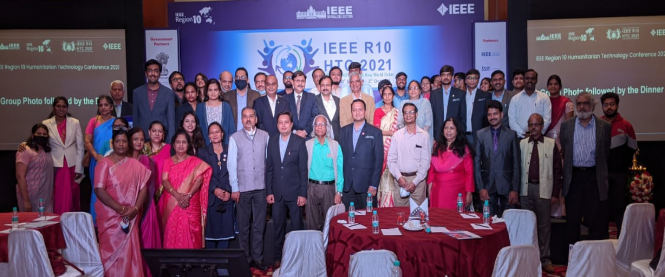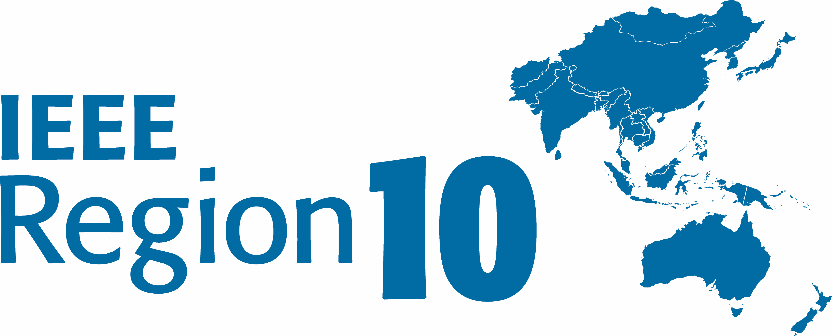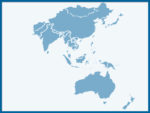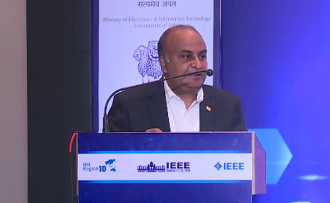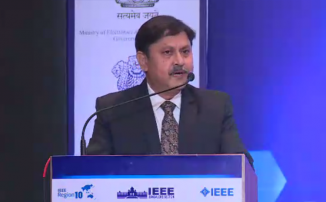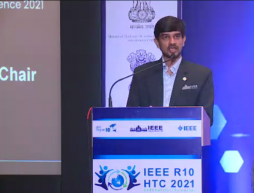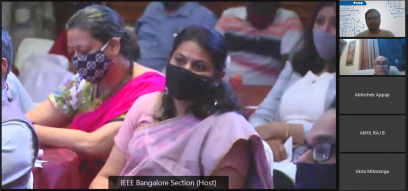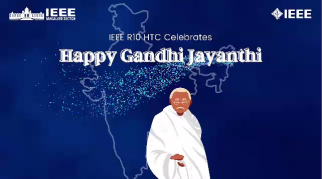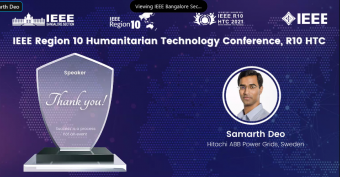30 September to 2 October 2021, Bangalore, India
Prepared by: Mohammad Faizal Ahmad Fauzi, Chair for the R10 Newsletter Committee
With the theme “Reverse Innovation for Humanitarian Technology Solutions using STEM Science, Technology, Engineering, and Management”, the IEEE Region 10 Humanitarian Technology Conference 2021 was successfully hosted by the IEEE Bangalore Section from 30th September to 2nd October, 2021. Due to the ongoing pandemic, the conference was conducted in hybrid mode, where the inauguration ceremony was held physically while authors presented their papers in online/virtual mode. The conference is made up of a rich variety of events including keynote and invited speeches, regular and special sessions, focused discussions, and special events. Prior to the official conference opening, HTA Day Celebrations and R10 Chapter-Section Event were also held in conjunction with the conference.
The inauguration ceremony was held on 30th September 2021, 6PM Indian Standard Time (IST) at the Chancery Pavilion Hotel with the presence of Region 10 Director, Deepak Mathur. The General Chair, Bindhu Madhava welcomed all participants and expressed his utmost appreciation to Mr. Deepak for attending the conference physically. The Organizing Chair, Abhishek Appaji then outlined the 3-day conference program to the audience. He also briefed on the history of the conference bidding by the Section. The Technical Program Chair, Chandrakanta Kumar presented the technical review statistics; the conference received a total of 272 paper submissions, with 89 papers eventually accepted for presentation across 24 parallel sessions. The conference continued with a virtual address by Sampath Kumar Veeraraghavan, Chair for IEEE Humanitarian Activities Committee (HAC), highlighting the importance of HAC and its initiatives. This is followed by an address by V.R. Lalithambika, Distinguished Scientist and Director of Directorate of Human Space Programme (DHSP), Indian Space Research Organization (ISRO), Bengaluru, India.
IEEE Region 10 Director, Deepak Mathur, then officially opened the 9th edition of R10HTC. In his speech, he recalled the history of the conference, which stems from several successful humanitarian projects in Region 10. He also announced the R10 HAC grants initiative, where projects are evaluated based on potential products, with assigned mentors for each approved project. Debabrata Das, Director, IIIT Bangalore, proposed a vote of thanks. The opening ceremony was rounded up by the Organizing Chair, Rajashekhar S., followed by a photo session for those physically present at the venue.
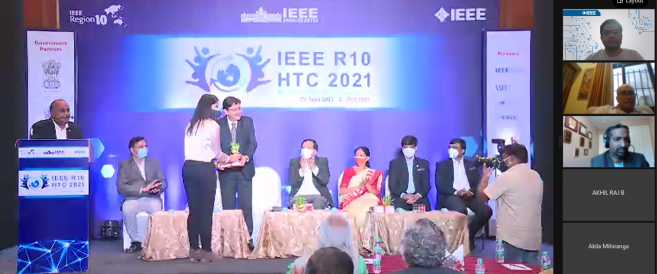
The second day of the conference consisted of 5 keynote speeches delivered by prominent researchers in humanitarian technology, 10 parallel tracks (including 2 special WIE tracks), and a student projects presentation. In the morning keynote session, Prof. Anil K Gupta from Honey Bee Network delivered a talk on “Grassroots Innovation: Frugality, Circulatory and Accessibility”, Dr. Manu Prakash from Stanford University talked on “Frugal Science” and Thulasiraj Ravilla from Aravind Eye Hospital shared his work on “Technologies Enabling Last Mile Delivery of Eye Care”. The afternoon keynote session featured Shanti Raghavan from Enable India who discussed the topic of “Assistive Solutions and Their Impact in Inclusion of People with Disabilities”, followed by Samarth Deo, Chair of EPICS in IEEE who talked on “How is Hitachi Energy Using Reverse Innovation to its Advantage in the Power Industry?”.
44 oral presentations, divided into 8 parallel sessions, were presented on the first day of the conference. The student projects presentation consisted of a 3-minute presentation, 3-minute video and 3-minute interaction with the students. Ten videos from all over Region 10 were shortlisted. The session was hosted by Raghavendra Prasad S G, with Dr. Dayaprasad Kulkarni acting as the judge. Day Two also featured special events such as the India Council track, industry demo session, focused discussion on collaborations between IEEE and NGOs, and IEEE YESIST presentations and demonstrations, among others.


The third and final day of the conference featured 14 parallel tracks (including special WIE, YP and Student tracks) with 46 oral presentations, an industry demo and projects display, focused discussion on collaborations between IEEE and the government, and several invited talks. The final day also featured the Gandhi Jayanthi Celebrations by IEEE Bangalore Section. At 7.30PM IST, the valedictory function and award ceremony was held. Dr. Chandrakanta and Dr. Ramakrishna announced the following best paper awards:
Track 1. Technologies and Innovations related to COVID-19 / Fight against epidemics and pandemics
Neha Ramesh Umrani, Shilpashree G R, Shaashwata Audichya, Ashritha Raj, Ashwini Kodipalli, “COVID-19 Vaccination Prediction in India Using Deep Learning”
Track 2. Biomedical Engineering for Good Health and Wellness
Shadman Sakib, Nowrin Yasmin, Ihtyaz Kader Tasawar, et. al., “Performance Analysis of Machine Learning Approaches in Diabetes Prediction”
Track 3. Agriculture and Food Security
Christan Hail R Mendigoria; Ronnie II S Concepcion; Elmer P. Dadios et. al., “Seed Architectural Phenes Prediction and Variety Classification of Dry Beans (Phaseolus Vulgaris) Using Machine Learning Algorithms”
Track 4. Energy and Clean Technologies
Debottam Mukherjee, Samrat Chakraborty, Ramashis Banerjee, Joydeep Bhunia, “A Novel Real-Time False Data Detection Strategy for Smart Grid”
Track 7. Sustainable Villages/Cities and Communities / Traffic systems
Maria Gemel B Palconit; Ronnie II S Concepcion; Jonnel Alejandrino, et. al. “Comparative ANFIS Models for Stochastic On-road Vehicle CO2 Emission using Grid Partitioning, Subtractive, and Fuzzy C-means Clustering”
Overall Best Paper Award
The organizing team from the Bangalore Section, no doubt deserves special appreciation for a well-organized hybrid conference!
